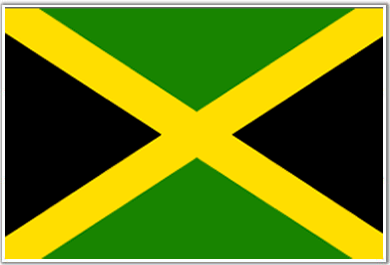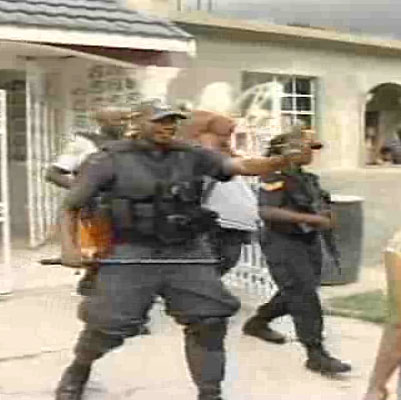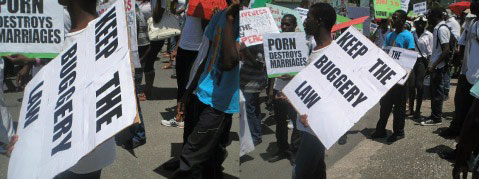Why I have to flee Jamaica
Colin Stewart is a 45-year journalism veteran living in Southern…
A “flamboyant” young gay man from Jamaica has decided that he has to flee from his country’s homophobia. Here he describes the repeated mistreatment by Jamaican police that led him to that decision.

EXCLUSIVE REPORT. Only with your support can we continue to challenge homophobia with reporting like this.
[paypal-donation]The author of this account is identified only as “D” in order to avoid endangering his job and family.
By D
On August 6 Jamaica celebrates its 56th year of independence and as a proud citizen I want to help my country realize the promise of our motto: “Out of Many One People.”
Coincidentally, this is the English version of the USA’s Latin motto: “E Pluribus Unum” and like many Jamaicans I have extensive family and friendly connections in the U.S. However, as a gay man neither Jamaica nor the U.S.A. seem to want me right now. And so, I am planning to join the exodus of gays fleeing to Europe or Canada.
I am a relatively well-paid entertainment professional in one of the major Jamaican hotels and I have wrestled with the decision to leave for some time. This is because I would be abandoning a career that is going well, a comfortable home, and all my family and friends to start my life all over again in a foreign country. I would also have to learn a new language in Europe or endure freezing winters in Canada that are completely alien to me.

However, after years of physical and mental abuse, including by police, I have reached my breaking point. And although things are changing in Jamaica, thanks to the advocacy of many organizations and individuals on the island, I fear that I may not live to see the day when Jamaicans unwaveringly accept and protect LGBT people.
I am out of the closet not by choice but by a natural disposition. I am what many Jamaicans call “flamboyant” and “openly gay.” My mannerisms and gesticulation often single me out me for assault. Thankfully I own a car, so I don’t have to rely on public transportation. Many gender non-conforming LGBT people like me who are forced to take buses or taxis either walk in packs or carry some form of weapon to defend themselves against the inevitable attacks.
But, I have also learned that even my car does not completely insulate me from homophobic harassment on the road.
Since I started working in the tourism sector nearly ten years ago I have lived in hotel dorms where I am forbidden to entertain guests. So, I would sometimes hang out with them in my car. On one Tuesday evening in June 2016 at about 7:30 p.m. a male friend “J” and I were parked on a lonely abandoned road near a hotel in the Ironshore community of Montego Bay. We had bought a meal at Burger King nearby and were just about to start eating when we were accosted by a police patrol car with flashing lights.
The cops were in full attack mode. They shone their torches in our eyes and demanded that we raise our hands for a spot check. The officers asked why we were out on this lonely road and I felt that the situation was obvious: we were having a meal together in my car.

However, their interrogation shifted to a conclusion that we seemed to be two males loitering, and engaging in homosexual intimacy, which is illegal in Jamaica. The officers threatened to arrest us and take us to a nearby police station for processing.
I begged for leniency. I knew that if word of this arrest got out I would lose my job and my family and friends would abandon me. Despite my pleas, the cops were unfazed until my friend stated rather repentantly that we were indeed homosexual friends having a time out.
He ordered me to be quiet to avoid any further “drama.” He also begged the police for leniency and fabricated a story that he was a jobless youth who was just with me to “get by.” He told the officers that he had a family and would rather not expose his sexual orientation to public scrutiny and condemnation.
After this “admission” the cops’ demeanour loosened up and one of them took my friend aside for a private discussion. When they returned, “J” ordered me to give the police all the money that I had, which was about Jamaican $5,000 (about US$37). After I did so, the officers left but not before they warned me to forget what just happened and to avoid lonely roads in the future.
In September of that year I met another young man “A” and we hit it off. After work one evening we drove to another unused road to hang out. We were kissing when suddenly we saw flashing lights, men clad in police suits, helmets, bullet-proof vests and M16s yelling at us. We were terrified. We were ordered out of the car. We were surrounded, and my worst nightmare was unfolding. I groaned that my death was here. I was confused and frightened. All my senses were obliterated. I felt my skin and eyes burning me. Later I learnt that I had been pepper-sprayed.
One officer broke branches off a tree and said that he was going to whip us. Another officer recorded the incident on his mobile phone and mocked me while I cried like a “sissy” (in his words). I went down on my knees praying and begging. They wanted to throw us in jail. I begged and pleaded for mercy.
“A” calmly talked his way out of punishment and told me that I needed to “pay up.” Just stop crying and calm down and do what the officers said. They wanted $25,000 (about US$187). The police handcuffed “A” in the back of the patrol vehicle and ordered me to drive in front of them to a nearby ATM to withdraw the sum. Then finally we drove to a nearby lonely road to hand over the money to the cops in exchange for “A’s” release. The matter was then dropped.
Since then I have not been able to maintain an intimate relationship. I am too petrified about “parking out” again and very few of my gay friends want me to visit their homes because of my mannerisms and what their family or neighbours may say.
I feel like I am living in a prison in my own county. And while I do not suffer the sort of physical abuse that many LGBT people in Jamaica experience, I am mentally devastated. My homeland of Jamaica, which is famous for “One Love,” has made it impossible for me to experience love. So, I will sadly have to leave to hopefully find it elsewhere.
Related articles:




